The Lilith Blog
December 1, 2016 by Amy Stone
Carole Zabar—The Woman Behind the Other Israel Film Festival
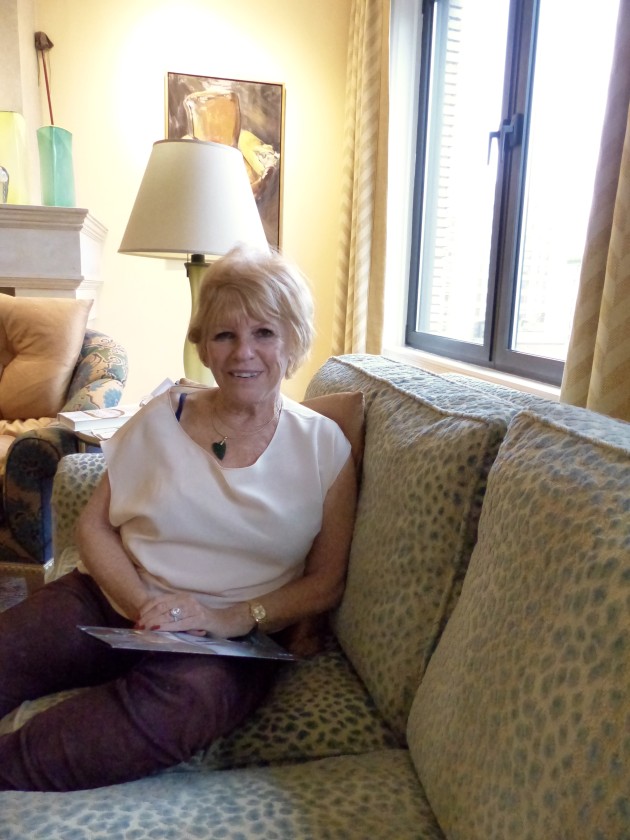
Carole Zabar at home on Manhattan’s Upper West Side, walking distance from the Other Israel Film Festival at the JCC Manhattan and Zabar’s.
Photo credit: Amy Stone
It takes one brainy person devoted to Israel, fluent in Hebrew, with a bachelor’s and master’s from Hebrew University, and a belief in the power of film to have the confidence to create the Other Israel Film Festival. What’s becoming a New York institution began as 100 percent Carole Zabar’s baby.
When the OIFF opens Thursday night, Dec. 1, at the JCC Manhattan, it will mark the 10th year of Carole Zabar’s vision – a festival that shows Israel’s minorities, including tensions between Jews and Arabs, in features, shorts, documentaries, Israeli TV shows.
- No Comments
November 25, 2016 by Amy Stone
Ruth Gruber – Unstoppable to 105
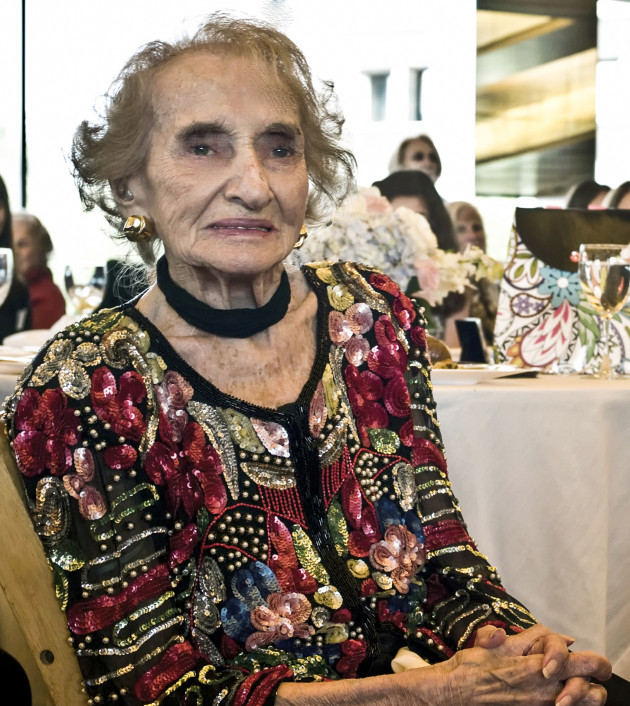
Photo of Ruth Gruber by Joan Roth
One of the last things Ruth Gruber did, slowed but unstoppable at 105, was to vote for Hillary Clinton. To observe the obvious, born in 1911, before women had the right to vote, she didn’t live long enough to see a woman president of the U.S. But she did help bend the arc of history with her camera, her words, and her passion for justice – most dramatically, by involving herself in Jewish rescue.
Ruth Gruber’s funeral, Sunday, November 20, filled B’nai Jeshurun synagogue on New York’s Upper West Side, near her long-time home on Central Park West, the twin towered, art deco Eldorado. (“El Dorado”—the legendary city of gold—seems an appropriate departure point for a fearless and adventurous woman.)
At the funeral, friends, family, and Rabbi Sally Priesand (America’s first ordained woman rabbi and the rabbi who officiated at Gruber’s second marriage) drew plenty of inspiration from Gruber’s life. In references to the current politics of fear, Gruber’s rescue of refugees was singled out as a challenge to all of us.
If this indefatigable woman had a role model, she or he went unnamed.
- 1 Comment
November 23, 2016 by Eleanor J. Bader
NPR’s Leah Donnella on Being a Biracial Jew
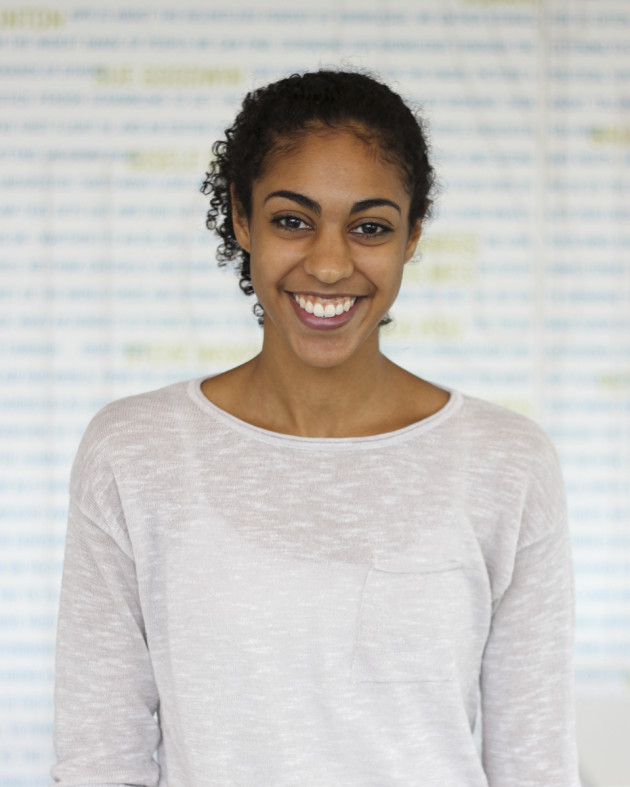
NPR’s Leah Donnella wrote a short personal essay entitled “Black, Jewish And Avoiding the Synagogue On Yom Kippur.” Photo Credit: Caitlin Sanders
Shortly before the world’s Jews welcomed year 5777 earlier this fall, National Public Radio’s Leah Donnella published a short personal essay entitled, “Black, Jewish And Avoiding The Synagogue On Yom Kippur.” In it, she described several unsettling incidents that left her feeling unmoored, a biracial Jew without a place in established Judaism. As the 25-year-old daughter of a white Jewish mother and an African-American Catholic father, Donnella says that she hopes the article will prompt American Jews to take stock of their assumptions and treat Jews of color not as strange, out-of-place, curiosities but as members of an increasingly diverse and vibrant spiritual community.
And although Donnella makes clear that she speaks for no one but herself, the fact that there are approximately 200,000 Asian, Black and Latino/a Jews living in the US further shows that her voice needs to be heeded and taken seriously.
Donnella spoke to Eleanor J. Bader by telephone two days after the Presidential election. Both interviewee and interviewer did their best not to dwell on the upsetting outcome.
- 1 Comment
November 22, 2016 by Helene Meyers
Shiva Ribbons, Not Safety Pins
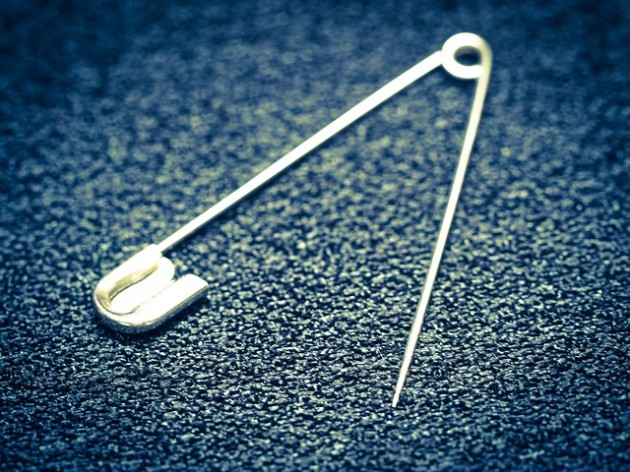 Taking a cue from those coping with Brexit across the pond, political fashionistas are sporting safety pins as a sign of alliance with those feeling even more vulnerable than usual after the election: immigrants, Muslims, people of color, women of all colors, lgbtq folks, to name just a few. As Bex Taylor-Klaus tweeted, “My #SafetyPin shows I will protect those who feel in danger bc of gender, sexuality, race, disability, religion, etc. You are safe with me.”
Taking a cue from those coping with Brexit across the pond, political fashionistas are sporting safety pins as a sign of alliance with those feeling even more vulnerable than usual after the election: immigrants, Muslims, people of color, women of all colors, lgbtq folks, to name just a few. As Bex Taylor-Klaus tweeted, “My #SafetyPin shows I will protect those who feel in danger bc of gender, sexuality, race, disability, religion, etc. You are safe with me.”
The safety pin movement is, of course, well-intentioned. It seeks to acknowledge diverse forms of privilege. Although those who view a vote for Trump as a hate crime against the republic are all in this together, the safety pin police rightly affirm that some are more immediately affected by a Trump presidency than others, that we’re not all feeling the same sort of terror. Yet this show of solidarity strikes me as misguided and even offensive for many reasons. It’s not only “embarrassing” and fastens over the fact that white people overwhelmingly voted for Trump, as Christopher Keelty has argued. It’s also paternalistic and presumptuous. Individual promises to protect one another are largely empty when it comes to mob and state-sanctioned forms of violence against classes of people. As history teaches us—over and over again—the kindness of strangers simply isn’t adequate when a cozy band of puppeteers that includes the likes of Stephen Bannon take control of democratic institutions and allow them to run amok.
- No Comments
November 18, 2016 by Amelia Dornbush
This Jewish Woman Heads the Nation’s Only Mathematics Museum
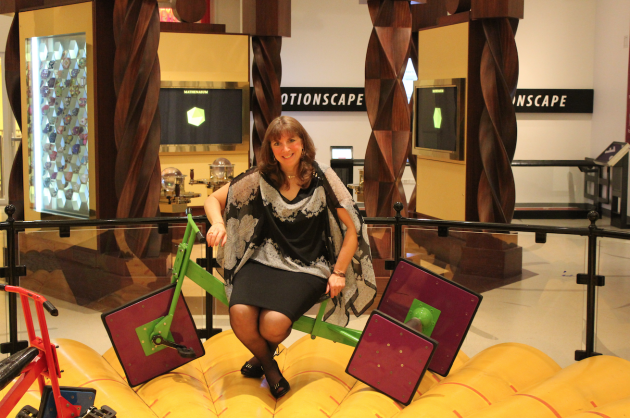
Photo Credit: National Museum of Mathematics
“MoMath wants to be the symphony of mathematics,” says Cindy Lawrence, founder and executive director of the National Museum of Mathematics, North America’s only mathematics museum. Lawrence notes that a child can hear a symphony and become inspired to be a musician, and that before this museum came into being, there was no way to generate this kind of enthusiasm about mathematics. Now, Lawrence tells stories of parents dragging crying children out of the museum because they don’t want to leave. Often, these same children didn’t want to go to a math museum in the first place.
Lawrence became involved with MoMath after meeting Glen Whitney, a fellow founder of the museum, at her temple.
- No Comments
November 17, 2016 by Rochelle Newman
About Your Boy Donald: An Open Letter to Melania Trump
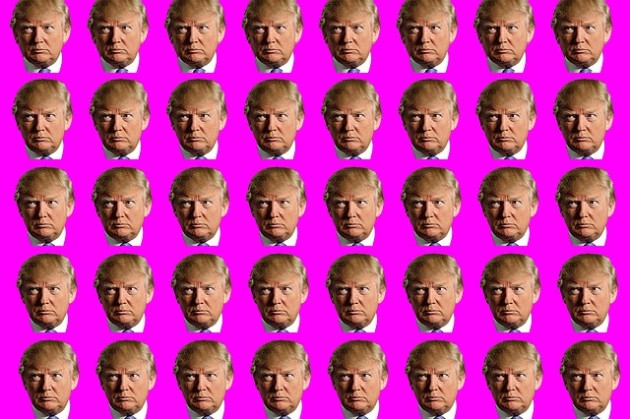 Dear Melania Trump:
Dear Melania Trump:
Here at World Is Watching High, the U.S. campus had an election. One candidate, who happened to be a girl, won the popularity contest. She didn’t want to be popular. She wanted to be President.
Strange how that worked out, since the school’s newspapers made sure everyone understood how very unpopular she was. She wasn’t a perfect candidate by any stretch of the imagination, but your boy’s henchmen and henchwomen showed no mercy. She was subjected to hacked emails, association with sexting and other forms of bullying, cyber and otherwise. She might have won if your boy didn’t buddy up with Russia. Who knows? We can’t turn back the clock.
Using the system we had in place, your boy won. Since all he cared about was winning, he used whatever tactics he could get away with no matter whom they hurt and how much damage they did.
- No Comments
November 16, 2016 by Liya Rechtman
Kiryat Arba, That Is, Hebron
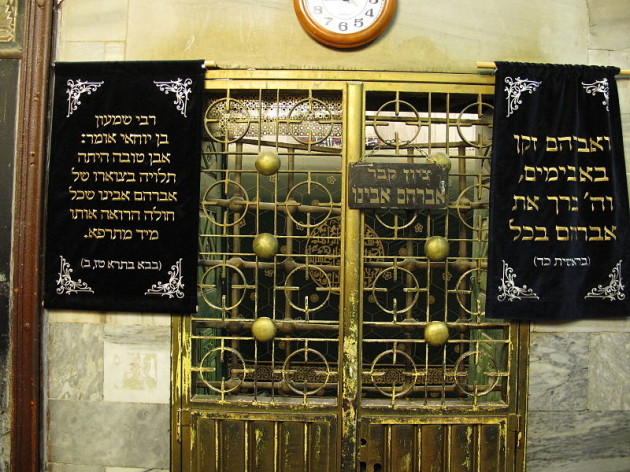
The Cenotaph of Abraham. (Photo Credit: A ntv, Wikimedia Commons.)
The first time a Jew bought land in the Biblical Land of Israel was for a burial plot of a woman, the matriarch Sarah. This story is recounted in Parshat Chayei Sarah, which is the Torah portion read this year in mid-November that can be translated literally as “the life of Sarah.” But Parshat Chayei Sarah isn’t about Sarah’s life, it’s about her death. It is Sarah’s death that allows the Jewish people to stake a claim in their land.
We see Abraham mourn Sarah’s passing, but his mourning is strategic. He asks the “people of the land, the Hittites” (Genesis 23:7) if he can buy a burial cave for her on the corner of their property. The Hittites initially offer him the land for free, but Abraham insists on buying it legally. In his moment of grief, and on behalf of the death of Sarah, he takes the opportunity to begin conquering the land of Canaan for Israel. Sarah, the nominal focus of this portion does not speak. Sarah has no stated wishes about where she is buried. Because she is dead, she has no say in the transactions done in her name.
- 1 Comment
November 15, 2016 by Liat Melnick and Annie Kaufman
Called to Standing Rock
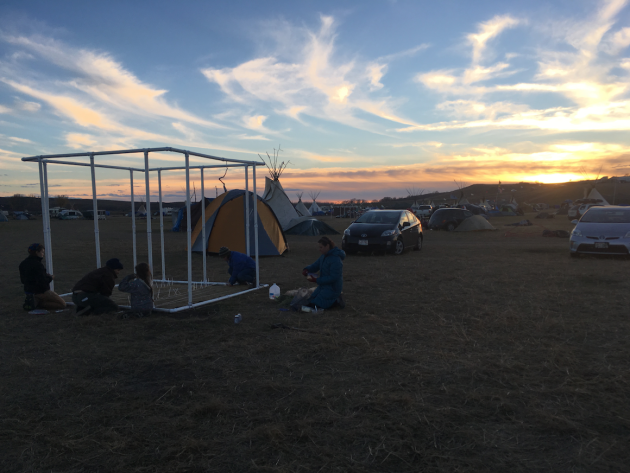
Building our sukkah at Oceti Sakowin with the help of our neighbors. (Liat Melnick)
Every dawn at the Oceti Sakowin (Och-et-ee Shak-oh-win) Camp in Standing Rock, North Dakota, we were awakened by a elder crying out over a loudspeaker, from the Sacred Fire, “Water Protectors wake up! We are here for a reason! We are here to cut the Black Snake’s head off! Do what you came here to do!… Take courage in your heart!” We were called to morning prayer, to the front lines and to prepare food for the community. These were the clearest shofar calls we have ever heard. We heard Native elders calling us from their traditions and experiences, “Wake up! There are injustices here and we are asking for the Creator to guide us in preserving the water and earth for ourselves and for future generations and you are here to support us.”
- No Comments
November 10, 2016 by Susan Weidman Schneider
A Post-Election Message from Lilith
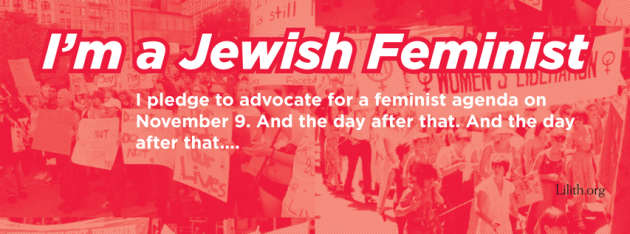 On Monday, lots of you pledged to advocate for a feminist agenda on November 9 and beyond. Some also wrote us to reveal why they were signing on. “Because Jewish tradition tells us that we must ensure we are counted and accountable.” “Our voices must be loud and clear.” And “the struggle is not over.”
On Monday, lots of you pledged to advocate for a feminist agenda on November 9 and beyond. Some also wrote us to reveal why they were signing on. “Because Jewish tradition tells us that we must ensure we are counted and accountable.” “Our voices must be loud and clear.” And “the struggle is not over.”
After the U.S. presidential election on November 8, women urgently posted, emailed and phoned their friends with some variant on this anxiety: “I’m afraid women will lose the right to decide what happens to our own bodies.” And afraid that some people they know and love will be sent away, deported. Afraid as Jews, because anti-Semitism unleashed during the election season echoes what we’ve seen before.
- No Comments
November 8, 2016 by Paula Caplan
Jewish and Feminist Themes in This New Off B’Way Play from Paula J. Caplan
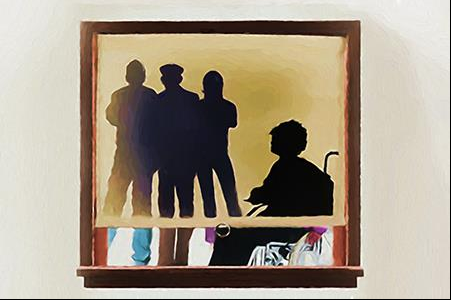
Image by Amy Smith
I grew up as a member of about 40 Jewish families in Springfield, Missouri, a Midwestern city of about 80, 000 people. My great-grandfather, Ben Karchmer, was a founder of the congregation there, and I have always been proud of my Jewish heritage. And I have been a feminist since the time, more than 45 years ago when I first learned about feminism. I was trained as a psychologist, and spoke at an early, germinal 1992 conference on Judaism, Feminism and Psychology in Seattle.
When I started writing plays more than twenty years ago, I soon realized that my religion and my feminism would inform that writing.
- No Comments
 Please wait...
Please wait...